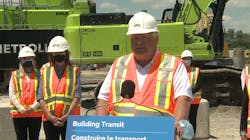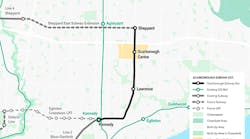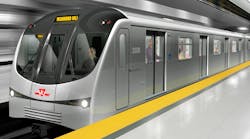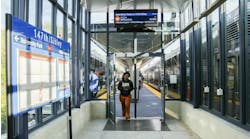Following years of discussion, months of negotiations and securement of funding, the first of the government of Ontario’s priority transit projects broke ground June 23.
The Scarborough Subway Extension will add three stops and bring Toronto Transit Commission’s Line 2 subway nearly eight kilometers (nearly five miles) from Kennedy Station to Sheppard Avenue and McCowan Road in Scarborough. The extension will replace a rapid transit line and provide connections to other transit options in the region.
When service begins between 2029 and 2030, it is expected 38,000 people will be within walking distance of rapid transit access with the extension’s anticipated daily boardings reaching 105,000 by 2041.
At a virtual event marking the start of construction on the project, many provincial and local leaders recognized the significance of the event in delivering on the long-discussed project.
“For far too many decades, the people of Scarborough have waited for better transit. Today, our government is getting shovels in the ground and delivering on our election promise to bring fast, convenient subway service into Scarborough,” said Premier Doug Ford. “This long overdue project will create thousands of jobs, significantly increase ridership capacity and cut down daily travel times for more than a hundred thousand Scarborough commuters.”
Toronto Mayor John Tory said it was a “remarkable good day” and noted many in the region had “become accustomed to underinvestment in Scarborough” before declaring “those days are over.”
The extension is expected to cost C$5.5 billion (US$4.56 billion) to build and the project is part of province’s largest ever transit expansion plan. In addition to the Scarborough Subway Extension, the priority transit projects included in the province’s C$26.8 billion (US$22.12 billion) transit plan are the Ontario Line, the Yonge North Subway Extension and the Eglinton Crosstown West Extension.
Earlier this year, the government of Canada agreed to finance up to 40 percent of the priority transit projects, which would be C$2.26 billion (US$1.84 billion) for the Scarborough Subway Extension.
Construction on the extension will be covered in two contracts in order to accelerate construction and delivery of the project. The first contract was awarded to Strabag AG at the end of May and includes design, launch and construction of the tunnels. A separate contract will be issued for remaining work on the extension including stations, fitting out the tunnel and installing and commissioning the systems to put the subway in to service.
Metrolinx reports crews have been working at the launch shaft site for where the tunnel boring machine (TBM) will eventually be lowered into the ground. Drill rigs have also arrived on site where they will create a watertight, foundational wall around the launch shaft before excavation can begin. The massive TMB is expected to arrive in 2022 and Metrolinx plans to hold a community contest later this year to crowdsource a name for the machine.
“This project is about delivering the reliable and modern rapid transit the people of Scarborough need,” said Phil Verster, Metrolinx CEO and president. “We’re so glad that shovels are now in the ground and people are hard at work to turn long-discussed plans into reality.”

Mischa Wanek-Libman | Group Editorial Director
Mischa Wanek-Libman is director of communications with Transdev North America. She has more than 20 years of experience working in the transportation industry covering construction projects, engineering challenges, transit and rail operations and best practices.
Wanek-Libman has held top editorial positions at freight rail and public transportation business-to-business publications including as editor-in-chief and editorial director of Mass Transit from 2018-2024. She has been recognized for editorial excellence through her individual work, as well as for collaborative content.
She is an active member of the American Public Transportation Association's Marketing and Communications Committee and served 14 years as a Board Observer on the National Railroad Construction and Maintenance Association (NRC) Board of Directors.
She is a graduate of Drake University in Des Moines, Iowa, where she earned a Bachelor of Arts degree in Journalism and Mass Communication.






